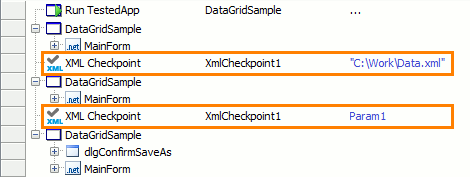XML checkpoints in TestComplete check the contents of a specified XML document by comparing it with the baseline copy stored in your project as an XMLCheckpoint element.
The XML checkpoint takes only one parameter - the source of XML data to be checked. This parameter can be one of the following:
-
The fully qualified name or URL of the desired XML document (it lets you compare the stored data with any XML file).
-
The
IXMLDOMDocumentobject (it lets you compare the stored data with any XML document). -
An
XMLCheckpointobject (it lets you compare the stored data with data of another XMLCheckpoint element). -
A
WebServiceobject (this functionality is used to create web service checkpoints).
If you want to re-use an XML checkpoint in your test, for example, to check multiple XML documents against the same baseline XML document, you can replace the hard-coded XML source with a parameter that obtains the desired XML document before the checkpoint is called. In other words, you may want to parameterize your XML checkpoint.
This topic describes how to parameterize your XML checkpoints:
In Keyword Tests
To parameterize your XML checkpoints in keyword tests, in the Operation Parameters dialog of the XML Checkpoint operation, replace the hard-coded name of the XML source with a keyword test parameter or with a keyword test, project or project suite variable containing the desired XML source.
The image below demonstrates two XML checkpoints. One of them verifies a hard-coded XML document, the other one verifies an XML document whose source is specified in the param1 keyword test parameter.

In Scripts
To parameterize your XML checkpoint in a script test, replace the hard-coded XML document passed to the XML.XMLCheckpointName.Check method with a script routine parameter or with a script, project or project suite variable containing the desired XML document.
The following routine demonstrates two XML checkpoints. One of them verifies a hard-coded XML document and the other one - the XML document, whose source is specified by the param1 parameter of the script routine:
JavaScript, JScript
function Test(param1)
{
…
XML.XmlCheckpoint1.Check("C:\\Work\\Data.xml");
…
XML.XmlCheckpoint1.Check(param1);
…
}
Python
def Test(param1):
...
XML.XmlCheckpoint1.Check("C:\\Work\\Data.xml")
...
XML.XmlCheckpoint1.Check(param1)
...VBScript
Sub Test(param1)
…
XML.XmlCheckpoint1.Check("C:\Work\Data.xml")
…
XML.XmlCheckpoint1.Check(param1)
…
End Sub
DelphiScript
procedure Test(param1);
begin
…
XML.XmlCheckpoint1.Check('C:\Work\Data.xml');
…
XML.XmlCheckpoint1.Check(param1);
…
end;
C++Script, C#Script
function Test(param1)
{
…
XML["XmlCheckpoint1"]["Check"]("C:\\Work\\Data.xml");
…
XML["XmlCheckpoint1"]["Check"](param1);
…
}
See Also
XML Checkpoints
XML Checkpoints
XML Checkpoint Operation
Check Method
Parameterizing Tests

 In Keyword Tests
In Keyword Tests